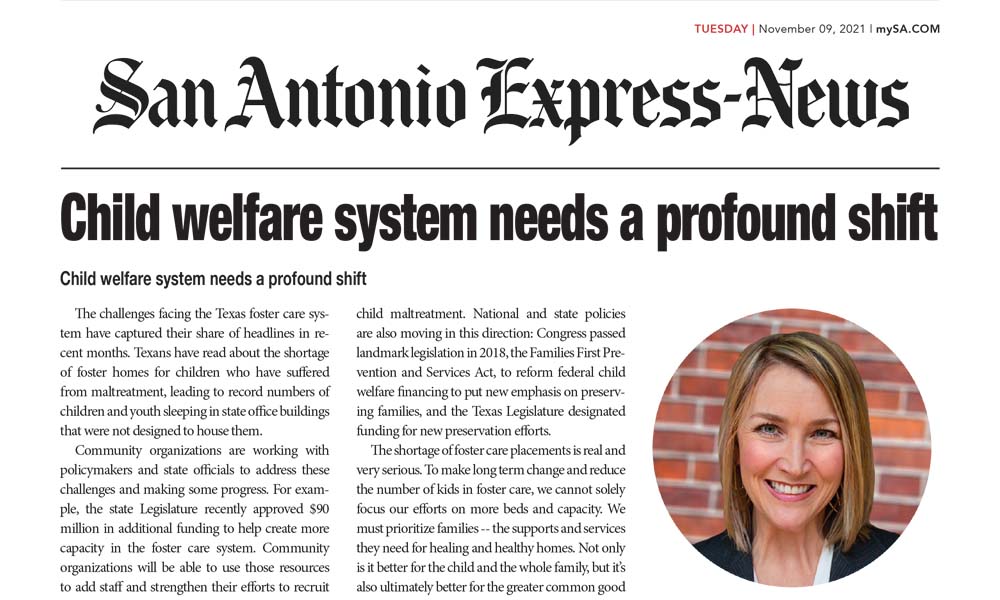The challenges facing the Texas foster care system have captured their share of headlines in recent months.
By Jenni Lord
The challenges facing the Texas foster care system have captured their share of headlines in recent months. Texans have read about the shortage of foster homes for children who have suffered from maltreatment, leading to record numbers of children and youth sleeping in state office buildings that were not designed to house them.
Community organizations are working with policymakers and state officials to address these challenges and making some progress. For example, the state Legislature recently approved $90 million in additional funding to help create more capacity in the foster care system. Community organizations will be able to use those resources to add staff and strengthen their efforts to recruit foster families.
However, as we all respond to the challenges in front of us, we cannot lose sight of the larger issues facing children who have suffered the trauma of abuse and neglect. Fundamentally, they have also experienced grief and loss that must be addressed to help them heal. Children in foster care have been harmed and are in the system through no fault of their own.
In order to best serve children, we need a profound, fundamental shift in the way we approach child welfare.
In short, we need to move from a child welfare system to a thriving child and family well-being system. This requires a muscular effort at all stages of service — in birth families that may be struggling, or in foster care or adoptive families — to strengthen families, prevent maltreatment and keep kids safe and stable at home.
Fortunately, movement in this direction is afoot. The U.S. Children’s Bureau, Casey Family Programs, the Annie E. Casey Foundation and Prevent Child Abuse America recently launched an effort called Thriving Families, Safer Children: A National Commitment to Well-Being to help jurisdictions move from traditional, reactive child protection systems to systems designed to proactively support child and family well-being and prevent child maltreatment. National and state policies are also moving in this direction: Congress passed landmark legislation in 2018, the Families First Prevention and Services Act, to reform federal child welfare financing to put new emphasis on preserving families, and the Texas Legislature designated funding for new preservation efforts.
The shortage of foster care placements is real and very serious.
To make long-term change and reduce the number of kids in foster care, we cannot solely focus our efforts on more beds and capacity. We must prioritize families — the supports and services they need for healing and healthy homes. Not only is it better for the child and the whole family, but it’s also ultimately better for the greater common good in society.
At Chosen, we provide birth, foster, and adoptive families with comprehensive mental and behavioral health services, responding to the trauma children have faced. And we have achieved a 100 percent success rate in keeping children from being returned to the child welfare system over the past five years because caregivers receive what they need to help their children heal.
One of our families adopted three siblings out of foster care. Soon, the children began experiencing a number of troubling behaviors and the couple’s marriage was faltering. Our team began working with them frequently, connecting the children with academic and mental health professional. In addition, we provided parent coaching for the father and they started marriage counseling. This approach stabilized the family and brought about significant healing; calls from school decreased and the family expressed finding hope again.
Children heal in families.
We must orient our child welfare system around something bigger than a place for kids to sleep at night. As we make budgetary and philanthropic decisions at the state and local levels, let’s consider the absolute best possible environment for children. Additionally, we must also ensure that robust services and supports are available. It’s time for systemic transformation.
Jenni Lord is the CEO of Chosen, an organization that equips caregivers with tools to help children heal from abuse. Chosen provides telehealth services throughout the state and has offices in New Braunfels and San Antonio.
About Chosen:
Chosen works to help children heal from trauma by strengthening their families. Our practitioners and licensed care managers work with families impacted by the child welfare system – including adoptive, foster, kinship (relative) families, and biological parents reunified with their children. Follow us on Facebook, and Instagram, or visit www.chosen.care to learn more.
Media Contact:
Wade Martin
VP of Strategic Partnerships & Content
wade@chosen.care
828.434.5180






